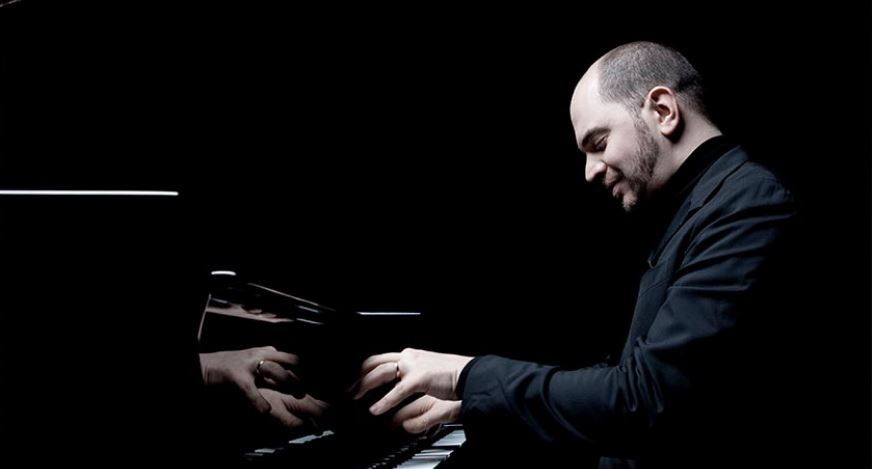The brilliance of an artist often shines brightest when they do the unexpected.
Kirill Gerstein, the 2010 Gilmore Artist, did just that during a Wednesday afternoon performance at the Wellspring Theater in front of a sold-out crowd leaving no doubt about his place among the greatest pianists of our time.
Gerstein’s program was to feature a work by Czechoslovakian composer Viktor Ullmann, titled “The Tale of the Love and Death of Flag-Bearer Christoph Rilke.” But, the audience was in for a pleasant surprise as Gerstein performed compositions by French composer Claude Debussy and little-known Armenian composer Komitas before launching into the Ullman piece.
“With every program I am fortunate to be able to do something unique and this is not happening anywhere else,” said Gerstein as he introduced a Debussy elegy. “I haven’t done this program before. You won’t hear it anywhere else.”
The second Debussy piece that he played, Les Soirs illumines par l’ardeur du charbon or “Evenings lit by glowing coals,” was written in gratitude and as payment to a man who supplied coal to heat his home during the cold winter of 1916. The composition, which was discovered in 2001, is evocative of the smells and sounds of a particular evening.
With his iPad perched on the piano, Gerstein began playing softly with a melody that included the sounds of jazz. It was at once relaxing and hopeful while incorporating some more playful notes which led into dramatic sounds.
“Imagine getting a souvenir like this when you’re a coal supplier,” Gerstein said at the conclusion of this piece.
The piece was written during World War II also to reflect the response to war and turmoil.
“(Debussy) wrote it as part of a collection to benefit the war effort,” Gerstein said.
Next, the audience was transported into the world of Komitas, a priest, who is widely considered a key figure in Armenian music.
During his lifetime, Komitas collected and transcribed more than 3,000 pieces of Armenian folk music, more than half of which were subsequently lost, and only around 1,200 are now extant. Besides Armenian folk songs, he also showed interest in other cultures and in 1904 published the first-ever collection of Kurdish folk songs. His choir presented Armenian music in many European cities, earning the praise of Debussy, among others.
“Debussy heard his music and was full of praise for him,” Gerstein said.
In April 1915, Komitas became a victim of the Armenian Genocide. He was arrested, along with a number of outstanding Armenian writers, publicists, physicians and lawyers, and transported to a prison camp where he was tortured.
“He was imprisoned and witnessed the murder of friends and colleagues,” Gerstein said. “He was significantly damaged during the genocide.”
After his release in 1916, he spent the last 20 years of his life in a mental asylum in Paris.
However, the Armenian dance tunes that he shared long before his imprisonment and decline, evoke a happier time that transports listeners to the mountains and echoes reminiscent of his homeland.
As Gerstein deftly navigated his fingers up and down the keyboard, his playing began with light and airy notes sprinkled with high notes to convey visions of dancers moving at a faster pace around the floor. The more carefree tones were then interwoven with a more sorrowful and regimented tinge.
Audible sighs of appreciation could be heard from audience members at the conclusion of the Komitas pieces.
The segue into the Ullman piece provided the perfect capstone to the program, which featured music by Gerstein and narration by D. Terry Williams, former head of Western Michigan University’s Theatre Department. Before launching into the 30-minute performance of the the tale based on a prose poem by German poet Rainer Maria Rilke, Gerstein said he finds the combination of piano and voice is very moving.
The poem tells the story of a low-level officer and cornet/flag-bearer who dies while fighting the Turkish army in 1663. Ullman penned the composition while he was imprisoned at Terezin, a concentration camp that was known as a “model” camp to convince visitors that detainees were being held and treated in a humane fashion.
“Riding, riding, riding, through the day, through the night,” Williams intoned as he stood in front of a music stand holding his script.
This was accompanied by Gerstein playing repetitive notes symbolizing the sounds of galloping horses. As the hoofbeats quiet, the musical notes became more wistful, lyrical and lighter as Williams described a German soldier reminiscing about his mother. The music became more lively, loud and emphatic — Gerstein’s hand movements reflect this — as the soldiers intermingled with a company supply train.
When the soldiers finally reach a castle, a safe haven, Gerstein pounded the keys and used the full range of the keyboard to reflect a wild party that ensues, complete with plentiful food, drink and women.
Leading up to the finale of the 12-vignette piece, Gerstein alternated between the lightest of touches on the keys to repetition of notes to pounding to symbolize the ensuing battle that takes the cornet’s life and the presentation of a letter to his mother months later, announcing his death.
As Gerstein stood and walked towards Williams, the audience spared no time in getting to their feet to offer enthusiastic applause and shouts of appreciation that brought the two men out for a second standing ovation.
Gerstein will perform an entirely different program on May 4 at Dalton Center.
Kirill Gerstein w/ D. Terry Williams
Wellspring Theater
May 2
thegilmore.org





